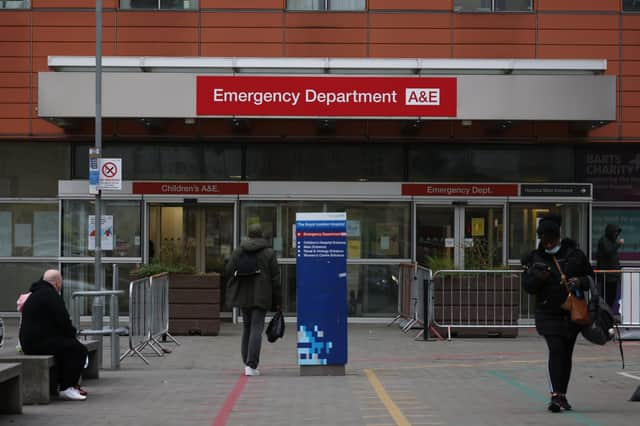Omicron: People with Covid variant 50-70% less likely to be hospitalised, UKHSA says
This article contains affiliate links. We may earn a small commission on items purchased through this article, but that does not affect our editorial judgement.


People are 50-70% less likely to be hospitalised with Omicron compared to previous strains of Covid-19, according to new evidence by the UK Health Security Agency (UKHSA).
The group called the new early data “encouraging” however, warned that Omicron infections could still lead to a large number of people in hospital.
Advertisement
Hide AdAdvertisement
Hide AdThe UKHSA released its findings after similar promising data was published in a joint study by Edinburgh University, Strathclyde University and Public Health Scotland.
Risk of hospitalisation lower than other strains
The early evidence compiled by the UKHSA has shown promising data on the Omicron variant.
According to the report, those infected with the strain are around 31%-45% less likely to go to A&E with Covid-19 related-illness.
It also crucially showed that those infected are 50%-70% less likely to be admitted to hospital.
Advertisement
Hide AdAdvertisement
Hide AdDr Jenny Harries, chief executive of the UKHSA, said: “Our latest analysis shows an encouraging early signal that people who contract the Omicron variant may be at a relatively lower risk of hospitalisation than those who contract other variants.”
However, Dr Harries did warn that if cases of Omicron continue to increase rapidly, hospitals will still be under pressure.
She said: “Cases are currently very high in the UK, and even a relatively low proportion requiring hospitalisation could result in a significant number of people becoming seriously ill.”
There are also warning as the early evidence shows that the virus is surging in younger age groups, with limited data on those over the age of 40 infected with the strain.
Vaccine boosters beginning to wane
Advertisement
Hide AdAdvertisement
Hide AdThe study also showed that the vaccine booster is extremely effective in preventing serious illness or death from the variant, with only two doses offering limited protection from being infected with the virus.
However, it also showed that the effectiveness of this begins to wane by 15%-25% 10 weeks after the booster dose.
Health Secretary Sajid Javid called the study “promising” but warned that the UK cannot afford to underestimate the situation.
He said: “Cases of the variant continue to rise at an extraordinary rate - already surpassing the record daily number in the pandemic. Hospital admissions are increasing, and we cannot risk the NHS being overwhelmed.”
A message from the editor:
Advertisement
Hide AdAdvertisement
Hide AdThank you for reading. NationalWorld is a new national news brand, produced by a team of journalists, editors, video producers and designers who live and work across the UK. Find out more about who’s who in the team, and our editorial values. We want to start a community among our readers, so please follow us on Facebook, Twitter and Instagram, and keep the conversation going. You can also sign up to our email newsletters and get a curated selection of our best reads to your inbox every day.
Comment Guidelines
National World encourages reader discussion on our stories. User feedback, insights and back-and-forth exchanges add a rich layer of context to reporting. Please review our Community Guidelines before commenting.
